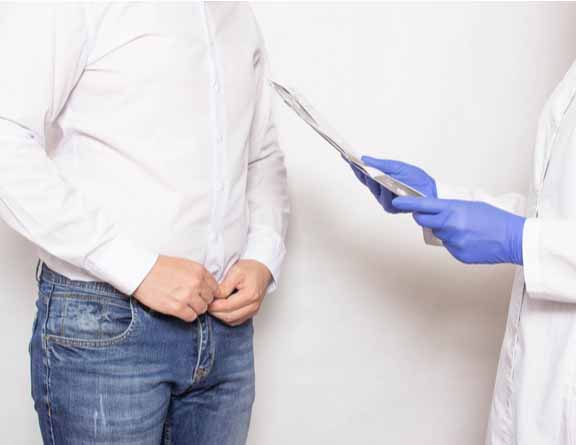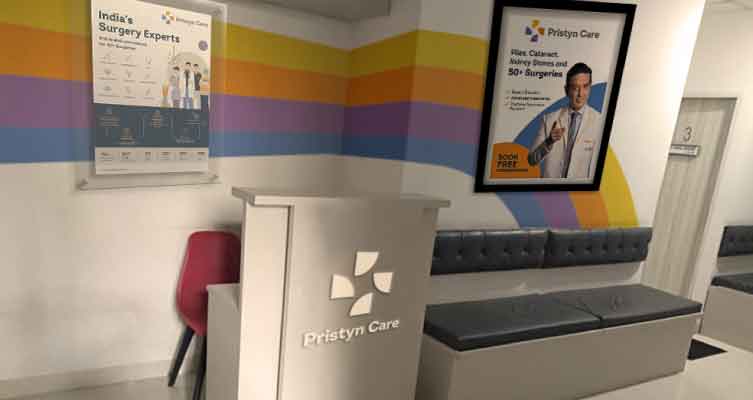
Mumbai
USFDA-Approved Procedure
Support in Insurance Claim
No-Cost EMI
1-day Hospitalization
Benign prostatic hyperplasia (BPH) refers to urinary issues due to enlarged prostate. It is a common disorder in men who are generally over 60 years. While some people choose to ignore the symptoms of an enlarged prostate, it can cause severe complications such as kidney damage, urinary retention (inability to pass urine), etc. Therefore, enlarged prostate treatment becomes necessary. Pristyn Care has some of the best BPH doctors in Mumbai with an average experience of more than 15 years. Our highly reputed doctors provide private and comprehensive consultation for your enlarged prostate (BPH) treatment in Mumbai. Call us to book FREE online or offline consultation with the best BPH doctor near you.


Enlarged Prostate Treatment in Mumbai
The diagnosis for an enlarged prostate involves a combination of physical examination and diagnostic tests to confirm BPH. Since heredity is a risk factor for BPH, the doctor will analyze your family history report. The doctor recommends the following tests to rule out the possibility of enlarged prostate due to other conditions. Some of the diagnostic tests include –
There are several surgical as well as non-surgical methods for BPH treatment which include various medications, dietary changes, and lifestyle modifications. However, non-surgical methods such as medications, home remedies, etc are effective to manage the symptoms of BPH and surgical treatment is the only method to treat enlarged prostate.
Medicine for Enlarged Prostate- Doctors generally prescribe medications to treat men with mild to moderate symptoms of BPH. These medicines ease the symptoms by calming the muscles in the prostate and bladder. However, there may be some side effects related to corresponding medications depending on the condition and severity of the disease. Some categories of medications prescribed by the doctor for BPH include-
Minimally invasive surgeries – These surgical techniques involve minimal invasion that can often be done as outpatient surgery, meaning the patient may not require a hospital stay. Recovery is generally quicker, but it depends on the medical condition of the patient and the surgical expertise of the surgeon. Minimally invasive techniques such as TURP, TUIP, etc., help the patients relieve symptoms quickly and may nullify the need for medications. Minimally invasive procedures are recommended in case of the following situations-
Based on these conditions, there are different techniques to perform minimally invasive procedures-
Laser surgeries – These are advanced surgeries that use high-energy lasers to destroy or remove the tissues around the enlarged prostate. Patients who undergo laser therapy procedures often feel instant relief. Moreover, laser surgeries have a lower risk of side effects than minimally invasive surgeries. Some of the advanced laser techniques for laser BPH procedures are-
You can visit our best Prostate Surgeons in Mumbai and nearby cities such as Pune.
Pristyncare%20Clinic.webp)
First Floor, B- 1-6 Dev Corpora, Eastern Express Hwy, Khopat, Thane West, Thane, Maharashtra 400601
Pristyncare%20Clinic.webp)
No B 6, Jayesh Apartment Chandavarkar Road,, Borivali West Off Kotak Mahindra Bank Mumbai Maharashtra, Mumbai, Maharashtra 400091
Pristyncare%20Clinic.webp)
Shop No 1, Ground Floor, Amogh CHS, Ganesh Galli, Lal Baug, Parel, Mumbai, Maharashtra 400013

Apple Diagnostics, Zenith CHS, Bus depo, opposite Marol Maroshi Road, near Seven Hills Hospital, Bhavani Nagar, Marol, Andheri East, Mumbai, Maharashtra 400059
Delivering Seamless Surgical Experience in India
Your safety is taken care of by thermal screening, social distancing, sanitized clinics and hospital rooms, sterilized surgical equipment and mandatory PPE kits during surgery.
A dedicated Care Coordinator assists you throughout the surgery journey from insurance paperwork, to free commute from home to hospital & back and admission-discharge process at the hospital.
Our surgeons spend a lot of time with you to diagnose your condition. You are assisted in all pre-surgery medical diagnostics. We offer advanced laser and laparoscopic surgical treatment. Our procedures are USFDA approved.
We offer free follow-up consultations and instructions including dietary tips as well as exercises to every patient to ensure they have a smooth recovery to their daily routines.
BPH is also known as benign prostatic hypertrophy, benign prostatomegaly, and benign prostatic hyperplasia. Although both BPH and prostate cancer are symptomatically similar, their etiologies have never been linked. BPH is very different from prostate cancer, and while not getting BPH treatment may severely impact your lifestyle, it will not cause prostate cancer.
PSA, or prostate-specific antigen, is a protein compound formed by the prostate gland. A PSA test result is one of the most reliable markers of prostate dysfunction by measuring PSA levels in the blood. In case of prostate enlargement due to BPH, prostate cancer, etc., PSA levels are high.
BPH does not cause constipation or any other gastrointestinal disorders. The prostate gland is located under the bladder and is wrapped around the urethra. Hence, while prostate enlargement directly impacts urinary function, it does not affect digestive function in any way.
Although the exact cause behind prostate enlargement is unknown, BPH is more likely to occur in men with the following characteristics: Over the age of 40 years Family history of benign prostatic hypertrophy Pre-existing medical conditions such as obesity, type 2 diabetes, cardiovascular diseases, etc. Sedentary lifestyle
BPH is the most common prostate problem in men. Almost 50% of men show some signs of prostate enlargement by the time they turn 60. Nearly 90% of men show signs of BPH by the age of 85 years.
Although normally both hypertension and BPH get worse over time, research has shown that this is due to aging and other age-related changes in the body, rather than being affected by each other.
According to some research studies, BPH can lead to an increased risk of inguinal hernia. This is because an enlarged prostate gland blocks the flow of urine, and the patient has to strain harder to empty their bladder.
The urologist considers many factors before recommending surgery to the patient. Generally, surgery is recommended for patients with 40 ml – 100 ml (40 g – 125 g) prostate gland size. However, the decision for surgery also depends on the severity of the symptoms. If the symptoms are severe, the surgeon may recommend surgery even for patients with moderately sized prostate glands.
Alpha-blockers, 5-Alpha Reductase Inhibitors, and Phosphodiesterase-5 Inhibitors are usually prescribed to BPH patients. Most urologists prefer prescribing medicines to manage the symptoms of mild to moderate BPH. It doesn’t stop the growth of the prostate gland completely, but it slows down its progression while providing relief from urinary symptoms.
The prostate gland is located just below the urinary bladder, wrapped around the entrance to the urethra. When the prostate gland is enlarged, it compresses the urethra and obstructs the urine flow. This leads to urine getting accumulated in the bladder (urinary retention), which can slowly lead to other urinary problems such as urinary tract infections (UTIs), bladder stones, kidney stones, kidney/bladder damage, etc.
A prostate exam primarily consists of two examinations: a blood test to check PSA level and a digital rectal exam. Men should start getting a routine prostate exam after reaching the age of 40 at least once every two years, once every year if the PSA level is higher than 2.5 ng/mL.
Prostatitis is an inflammation of the prostate gland. It usually occurs due to an acute bacterial infection. On the other hand, BPH is prostate gland enlargement due to aging. BPH itself does not cause any pain or discomfort. However, it blocks urine flow and causes urinary symptoms.
BPH itself does not cause any pain. It restricts the flow of urine from the urethra, which leads to dysuria, i.e. painful and difficult urination. It can also cause pain during ejaculation.
Though there are many treatments for BPH, the most reliable, effective and long-lasting treatments are TURP and HoLEP surgery. The cost of Transurethral resection of the prostate (TURP) is approximately INR 60,000 to INR 1,00,000. The cost of laser procedure (HoLEP) is approximately around INR 1 lakhs to INR 1.5 lakhs.
Untreated BPH can lead to urinary retention. Urinary retention is a condition in which a person is unable to empty their bladder completely, no matter how hard they try. This is very harmful for the urinary system and leads to a variety of urinary problems such as urinary tract infections, dysuria (painful urination), urinary incontinence, bladder/kidney stones, etc. In addition to this, BPH also makes ejaculation painful and difficult leading to erectile dysfunction. All of these symptoms combined have deep psychological impact and can lead to depression in older men.
If you are exhibiting symptoms of BPH, book a free consultation with the best urologists in Mumbai to seek the best prostate enlargement treatment near you.
Both HoLEP and TURP are fundamentally similar and work by reducing the prostate size to relieve the urinary symptoms. However, there are a few basic differences between TURP and HoLEP procedures as explained below:
Although minimally invasive surgeries such as TURP and HoLEP for BPH treatment are extremely safe and complication-free, in rare cases, you might experience minor complications like:
All these side effects are mostly temporary and can be easily managed by expert urologists in Mumbai at Pristyn Care.
Pristyn Care is associated with the best urology hospitals in Mumbai, where you can avail the best treatment for prostate enlargement. Some other facilities provided by Pristyn Care are:
You can book an appointment at Pristyn Care by:
Tanmay Holkar
Recommends
Pristyn Care's treatment for prostate enlargement was prompt and effective. The urologist explained the condition clearly, and the prescribed treatment improved my quality of life. Pristyn Care's support during my treatment journey was commendable.
.svg)
.svg)
.svg)